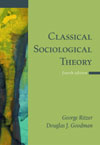
Alfred Schutz |  |
Chapter Outline
I. Interpretations of Schutz's WorkA. Ethnomethodology and Social Construction B. Lack of Macrostructure C. Cultural Determinism |
II. The Ideas of Edmund HusserlA. Phenomenology 1. Transcendental Ego
2. Intentionality
3. Science
4. Experience
5. Natural Attitude
6. Bracketing
7. Life-World
8. Intersubjectivity
|
IV. Science and the Social WorldA. Life-World versus Science B. Constructing Ideal Types 1. Postulate of Relevance
2. Postulate of Adequacy
3. Postulate of Logical Consistency
4. Postulate of Compatibility
5. Postulate of Subjective Interpretation
|
V. Typifications and Recipes |
VI. The Life-WorldA. Basic Characteristics 1. Wide-Awakeness
2. Suspension of Doubt
3. Working
4. Total Self
5. Intersubjective World of Communication
6. Time
B. Knowledge 1. Knowledge of Typifications and Recipes
2. Knowledge of Skills
3. Useful Knowledge
|
VII. IntersubjectivityA. Knowledge and Intersubjectivity 1. Reciprocity of Perspectives
2. Interchangeability of Standpoints
3. Congruency of the System of Relevance
4. Social Origins of Knowledge
5. Social Distribution of Knowledge
B. Private Components of Knowledge |
VIII. Realms of the Social WorldA. Folgewelt and Vorwelt B. Umwelt and We Relations C. Mitwelt and They Relations |
IX. Consciousness, Meanings, and MotivesA. Consciousness B. Meanings 1. Subjective Meaning Context
2. Objective Meaning Context
C. Motives 1. In-order-to Motives
2. Because Motives
|
X. Interpreting Schutzian TheoryA. Abstract B. Phenomenology and Sociology C. Dialectical Relationships |
|
|